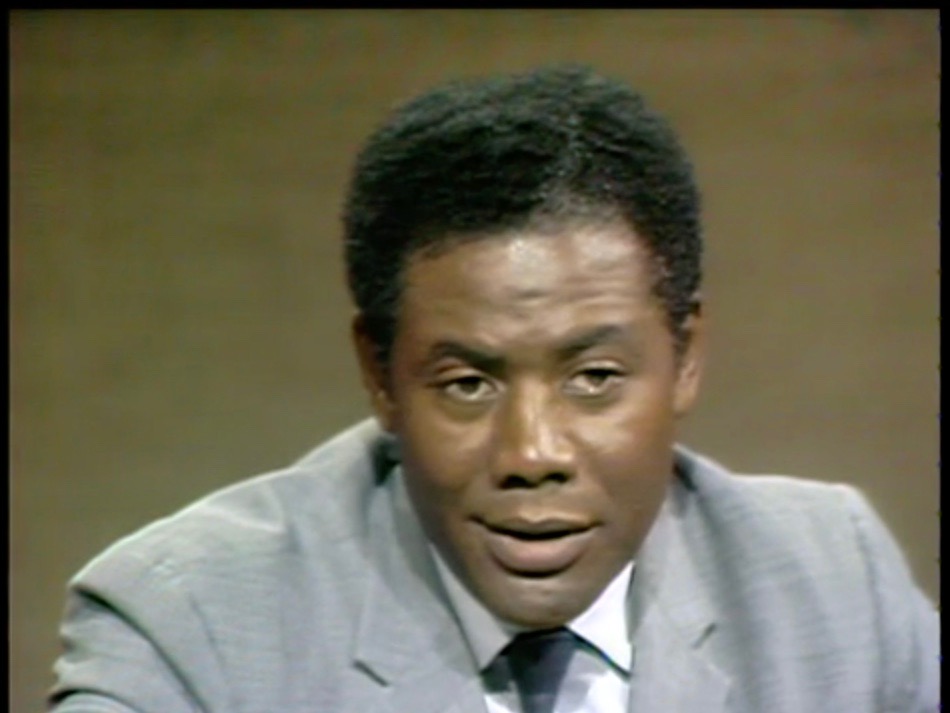Black Journal; 36; Genocide?
- Series
- Black Journal
- Episode Number
- 36
- Episode
- Genocide?
- Producing Organization
- WNET (Television station : New York, N.Y.)
- Contributing Organization
- Library of Congress (Washington, District of Columbia)
- AAPB ID
- cpb-aacip/512-9p2w37mm9j
- NOLA Code
- BLJL
If you have more information about this item than what is given here, or if you have concerns about this record, we want to know! Contact us, indicating the AAPB ID (cpb-aacip/512-9p2w37mm9j).
- Description
- Episode Description
- Two black American authors, John A. Williams and Samuel F. Yette, deal with the crucial question of Genocide? on Black Journals fourth show of the new season. Williams deals fictionally with the theme of genocide in his novel The Man Who Cried I Am. A former Ebony associate editor and director of the Office of Economic Opportunity, Yette documents what he calls existing factors of genocide in The Choice: The Issue of Black Survival in America. On Black Journal both articulate their views, with Yette (now a Washington correspondent for Newsweek) pointing to the essential aspects of genocide in our society: extreme racial hostility and economic class hostility. We have the vested interests, we have those who make profit out of repression, we have the lack of black social value historically, and also currently we have the loss of economic value on the part of black people. Citing another threat of genocide Yette adds, We have the legalization of the police state as the no-knock search and seizure (and) the preventive detention bill. Williams discusses his prophetic King Alfred Plan, the governments final solution to the black question vaporization. He created the plan in his book to answer What would an administration do when a large segment of the population threated the order and established regime? Since the book has been published, Williams notes that We all know that practically every city government has announced a contingency plan for dealing with rebellion, i.e. black people in rebellion, and not only city governments, but the federal government. Adding credence to that assertion is Yettes contention that a division of the Justice Department, the Law Enforcement Assistance Administration (LEAA), is right now building what they call regional detention facilities which, in fact, are concentration camps in virtually every state in the country. Thats going on now. Other revelations elicited by the Black Journal discussion on genocide include: attempts to establish mandatory sterilization for unmarried girls; the over-exposure of many black people to doses of X-rays that can cause leukemia, cancer, and sterilization; and different 1970 census questionnaires issued to blacks and minorities and not to the white majority. Black Journal, a production of NET Division, Educational Broadcasting Corporation. (Description adapted from documents in the NET Microfiche)
- Series Description
- Black Journal began as a monthly series produced for, about, and to a large extent by black Americans, which used the magazine format to report on relevant issues to black Americans. Starting with the October 5, 1071 broadcast, the show switched to a half-hour weekly format that focused on one issue per week, with a brief segment on black news called Grapevine. Beginning in 1973, the series changed back into a hour long show and experimented with various formats, including a call-in portion. From its initial broadcast on June 12, 1968 through November 7, 1972, Black Journal was produced under the National Educational Television name. Starting on November 14, 1972, the series was produced solely by WNET/13. Only the episodes produced under the NET name are included in the NET Collection. For the first part of Black Journal, episodes are numbered sequential spanning broadcast seasons. After the 1971-72 season, which ended with episode #68, the series started using season specific episode numbers, beginning with #301. The 1972-73 season spans #301 - 332, and then the 1973-74 season starts with #401. This new numbering pattern continues through the end of the series.
- Broadcast Date
- 1971-10-26
- Asset type
- Episode
- Topics
- Race and Ethnicity
- Media type
- Moving Image
- Credits
-
-
Executive Producer: Brown, Tony
Guest: Williams, John A.
Guest: Yette, Samuel F.
Producing Organization: WNET (Television station : New York, N.Y.)
- AAPB Contributor Holdings
-
Library of Congress
Identifier: 1835232-1 (MAVIS Item ID)
Format: 2 inch videotape
Generation: Master
Color: Color
Duration: 0:29:30
-
Library of Congress
Identifier: 1835232-3 (MAVIS Item ID)
Generation: Copy: Access
Color: Color
-
Library of Congress
Identifier: 1835232-2 (MAVIS Item ID)
Generation: Master
Color: Color
If you have a copy of this asset and would like us to add it to our catalog, please contact us.
- Citations
- Chicago: “Black Journal; 36; Genocide?,” 1971-10-26, Library of Congress, American Archive of Public Broadcasting (GBH and the Library of Congress), Boston, MA and Washington, DC, accessed August 20, 2025, http://americanarchive.org/catalog/cpb-aacip-512-9p2w37mm9j.
- MLA: “Black Journal; 36; Genocide?.” 1971-10-26. Library of Congress, American Archive of Public Broadcasting (GBH and the Library of Congress), Boston, MA and Washington, DC. Web. August 20, 2025. <http://americanarchive.org/catalog/cpb-aacip-512-9p2w37mm9j>.
- APA: Black Journal; 36; Genocide?. Boston, MA: Library of Congress, American Archive of Public Broadcasting (GBH and the Library of Congress), Boston, MA and Washington, DC. Retrieved from http://americanarchive.org/catalog/cpb-aacip-512-9p2w37mm9j
